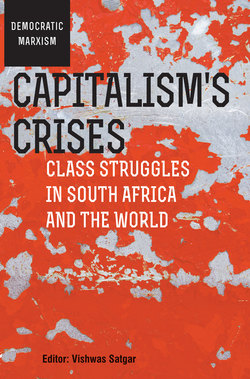Читать книгу Capitalism’s Crises - Alfredo Saad-Filho - Страница 7
На сайте Литреса книга снята с продажи.
INTRODUCTION
ОглавлениеVishwas Satgar
Until recently, the Great Depression of the 1930s was considered the worst crisis of capitalism. Today, historians, economists and the business media have confirmed that we are now experiencing the worst crisis of contemporary capitalism. The early-twentieth-century Great Depression seems to pale in comparison to the ‘great financial crisis’ that occurred at the beginning of the twenty-first century. Despite the massive bailouts given to banks and finance houses, deepening austerity in the heartlands of capitalism and a tenuous continuity in growth rates in countries like China and India, the end of the crisis is not in sight. This, of course, does not mean capitalism is about to collapse – but it is certainly in a state of deepening crisis and will probably reach a historical terminus, like all social systems before it.
However, this volume does not attempt to make catastrophic predictions, but instead sets out to explain and provide an understanding of the unfolding crisis by bringing into view its underlying dynamics.
With such a deep systemic and conjunctural crisis facing neoliberal capitalism, both in South Africa and beyond, one would intuitively expect the Left to be on the rise and gaining ground. Yet there seems to be an unevenness regarding effective left-wing responses to the crisis. In most instances, trade unions, social movements and left-wing parties seem to be advancing responses that are incapable of bridging the gulf between the current realities and popular expectations of progressive transformation, such as employment creation and less inequality. The weaknesses and advances of the Left in response to the current context are critically assessed in this volume.
By applying a rigorous Marxist (and neo-Marxist) political-economic analysis of the contemporary capitalist crisis and the Left’s response to it, this volume confronts some of the inherited weaknesses of Marxist theoretical approaches to capitalist crises. The first weakness, according to Lilley (2012: 44), can be referred to as the ‘vanguardist’ dyad of structural determinism, on the one side, and voluntarism on the other.1 Structural-determinist approaches give primacy to the ‘laws of history’ and the limits of the capitalist system (or the internal weight of its own contradictions). Voluntarist approaches tend to emphasise greater suffering and worsening conditions, and ultimately argue that state repression will reveal the essence of the capitalist crisis. Put differently, neither approach takes account of the connection between capitalist crisis and the challenging task of building democratic, mass-movement-driven politics. The second weakness is how conceptions of capitalist crisis are inserted into struggle. Both of these approaches propagandise capitalist crisis to such an extent that theoretical analysis is used as an instrument to affirm that history is on the side of the working class and therefore an automatic awakening of consciousness is meant to follow. Yet nowhere has this panned out in actual history or struggle.
Furthermore, both of these approaches tend to guide practice in particular ways. A structuralist approach tends to abstain from struggle, whereas a voluntarist approach arrogantly proclaims its need to make history now by accelerating collapse or crisis through adventurist intervention.
In this volume the authors seek to confront these weaknesses of orthodox vanguardist Marxist theory and its practical political conclusions. In the process, the book seeks to go beyond twentieth-century communist and social-democratic understandings of the crisis. Instead, the volume raises democratic Marxist perspectives on the crisis, and looks at contemporary left agency and the need for transformative politics, rather than vanguardist revolutionary or reformist left politics. This volume therefore takes forward themes that are referred to but not fully elaborated in Volume 1 in this series, titled Marxisms in the 21st Century. The first volume provided a research agenda and suggested lines of development for democratic Marxism. In this volume, by elaborating on the themes of capitalist crisis and class struggle, the authors affirm the need for open, engaged and living Marxism in relation to contemporary realities of globalising capitalism. At the same time, such perspectives derive from activist scholars, activists engaged in movements and intellectuals from the Left. None pretend to have all the answers or a monopoly on the truth, but they offer different ways of engaging with the vast historical corpus of Marxism, and provide new analyses of capitalist crisis, situated struggle perspectives and thoughts for strengthening democratic, bottom-up, left agency.
